| Srl | Item |
| 1 |
ID:
163448
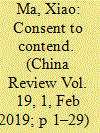

|
|
|
|
|
| Summary/Abstract |
�is study explores how local o�cials tolerate and use mass mobilization to extract policy concessions from above. Local o�cials strategically tolerate mass mobilization when the demands of the masses are
congruent with elements of their own agenda that they are otherwise
unable to pursue. Protestors in the streets turn out to be a powerful
bargaining chip for local o�cials: they illustrate ex ante that higher
level leaders risk causing social instability if they reject the masses’
demands. �e article lays out the institutional environment that gives
rise to such a strategy, presents a detailed case study focusing on the
|
|
|
|
|
|
|
|
|
|
|
|
|
|
|
|
| 2 |
ID:
172067
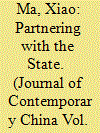

|
|
|
|
|
| Summary/Abstract |
How does the size of local state-owned sector affect the flow of foreign direct investment (FDI) to that region? Using an original county-level dataset for China’s Yangtze Delta Region, this article finds that counties inheriting a larger state-owned sector from the planned-economy era have attracted more FDI since the outset of the market reform. The article argues that early foreign investors tended to invest in locales with a robust state sector to build joint ventures with local state-owned firms, as doing so helped them satisfy state regulations and reduce various political and market risks. The legacies of the planned economy also shaped local states’ preferences, leading to persistent variations in local economic structure. An instrumental variable analysis suggests that the association is likely causal.
|
|
|
|
|
|
|
|
|
|
|
|
|
|
|
|
| 3 |
ID:
163249
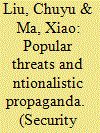

|
|
|
|
|
| Summary/Abstract |
Conventional wisdom suggests that authoritarian leaders use nationalist propaganda as a tool to strengthen mass support. Yet few studies have provided systematic evidence to account for specific tactics underlying these information manipulations. We argue that autocrats, recognizing the material costs of propaganda, are more likely to target localities with the greatest antiregime potential. Using a unique dataset of “patriotic education sites” that the Chinese Communist Party assigned throughout China as tools to advance its nationalistic campaign, we found a systematic association between these locations and the scale of antiregime mobilization in the 1989 prodemocracy movement. The longer the antiregime protest lasted in a city in 1989, the greater the number of patriotic education sites the city contains. Our findings highlight the strategic way in which autocrats manipulate nationalist propaganda to mitigate popular threats.
|
|
|
|
|
|
|
|
|
|
|
|
|
|
|
|
| 4 |
ID:
145828
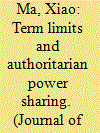

|
|
|
|
|
| Summary/Abstract |
Term limits that effectively govern leadership transition play an important role in authoritarian power sharing. A fixed term and a pre-appointed successor – two crucial components of term limits – credibly commit the incumbent ruler to share power with other elites, and also allow the elites to monitor and coordinate against the ruler's transgression of the power-sharing agreement. While the successful adoption of term limits often requires an even balance of power among the ruling elites in the first place, once adopted it initiates an evolving bargain over allocation of political power among multiple generations of leaders that further keeps any one faction from dominating the others. I corroborate this argument using a biographical dataset of elite members of the Chinese Communist Party from 1982 to 2012. The findings suggest that the Party's incumbent leaders and their rivals (i.e., predecessor and heir-apparent) shared equal chances in promoting their associates—which proxy their political influence—and this pattern has become more salient since the 16th party congress, when the term limits that currently govern China's leadership transition became fully fledged. This result also sheds light on the role of informal, patronage-based promotion in the institutionalization of authoritarian politics.
|
|
|
|
|
|
|
|
|
|
|
|
|
|
|
|
| 5 |
ID:
179294
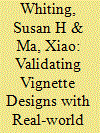

|
|
|
|
|
| Summary/Abstract |
How well do vignette designs capture actual behaviour in the real world? This study employs original survey data featuring both hypothetical vignettes and behavioural questions in order to assess the external validity of descriptive and causal inferences in survey experiments. The survey was conducted in a three-province, probability-proportional-to-size sample of 1,897 rural residents in China and focuses on the legal mobilization of citizens in response to grievances involving land rights. In terms of descriptive inference, we find that relative to the behavioural benchmark, hypothetical vignettes significantly over-estimate legal mobilization in response to a grievance, particularly for higher-cost actions like petitioning the government and litigating in court. We find that data from hypothetical vignettes affect causal inference as well, producing significantly different results regarding the effect of political connections and legal knowledge on legal mobilization. The study makes a contribution by identifying conditions under which hypothetical vignettes are less likely to produce valid inference. It engages a rich literature on disputing and legal mobilization in the field of Chinese politics and helps to resolve debates over the role of political connections and legal knowledge.
|
|
|
|
|
|
|
|
|
|
|
|
|
|
|
|